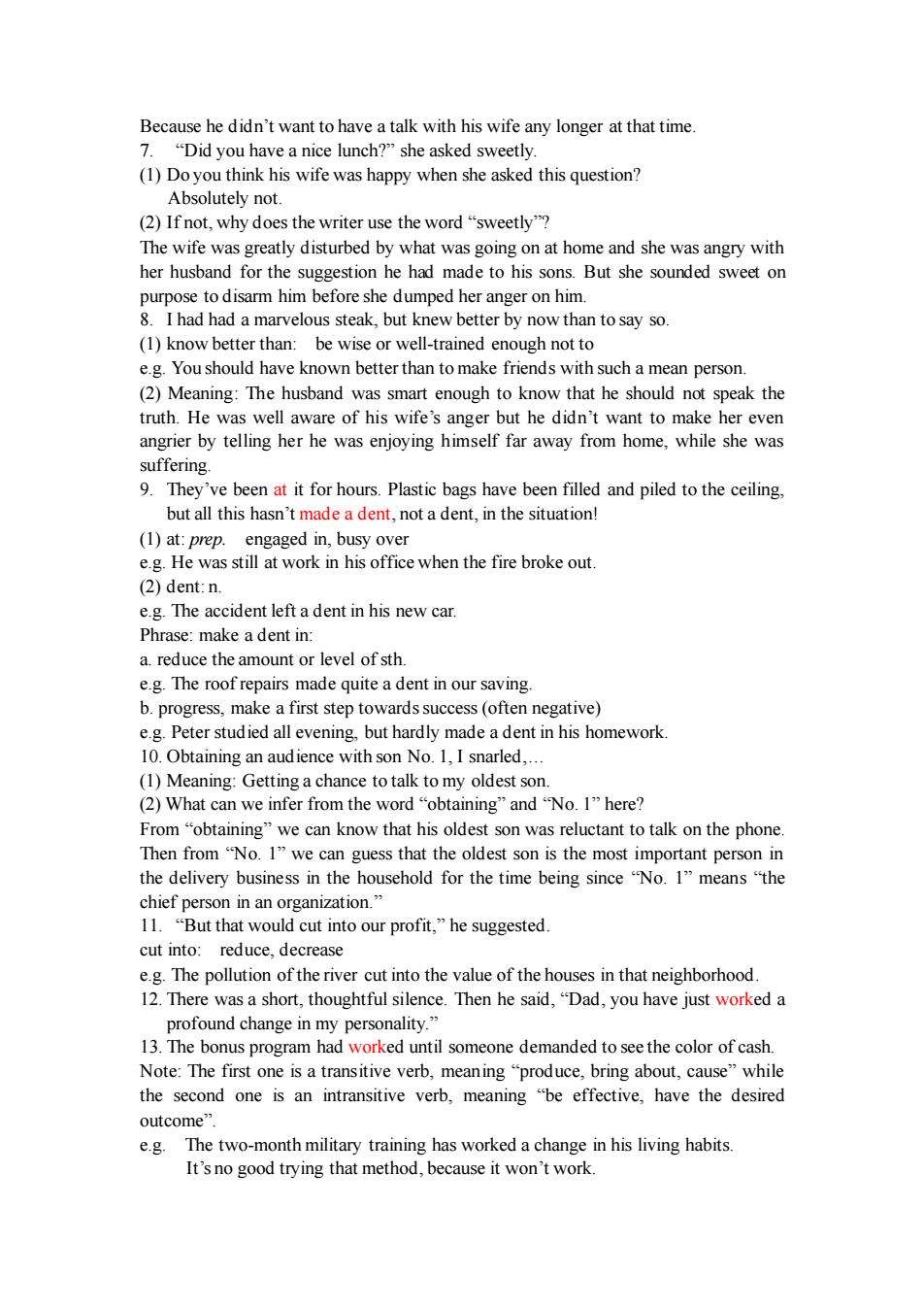正在加载图片...

Because he didn't want to have a talk with his wife any longer at that time 7."Did you hav e a nice lunch?"she asked s d this question? Absolutely not (2)If not.why does the writer use the word"sweetly? The wife was greatly disturbed by what was going on at home and she was angry with her husband for the su sons.But she sounded s eet or she dumped he r anger on h I had had a marvelous steak,but knew better by now than to say so. (1)know better than:be wise or well-trained enough not to e.g.You should have known better than to make friends with such a mean person. (2)Meaning:The husband was smart enough to know that he should not speak the truth.He wa well aware of his wi ife's anger t he didn't want to m her ever angrier by telling her he was enjoying himself far away from home,while she was suffering. 9.They've been at it for hours.Plastic bags have been filled and piled to the ceiling. but all this hasn't made a dent,not a dent,in the situation! (1)at:prep. He ws (2)dent:n. e.g.The accident left a dent in his new car. Phrase:make a dent in: a.reduce the amount or level of sth. e.g.The roof repairs made quite a dent in our saving b.progress,make a first step towards success(often negative) e.g.Peter studied all evening,but hardly made a dent in his homework 10.Obtaining an audience with son No.1,I snarled,. (1)Meaning:Getting a chance to talk to my oldest son (2)What c n w ve infer from the vord“obtaining”and"No.1"here2 From"obtaining"we can know that his oldest son was reluctant to talk on the phone Then from "No.1"we can guess that the oldest son is the most important person in the delivery business in the household for the time being since "No.1"means"the chief person in an organization. 11."But that would cut into our profit,"he suggested. cut into reduce,decrease e.g.The pollution of the river cut into the value of the houses in that neighborhood. 12.There was a short,thoughtful silence.Then he said,"Dad,you have just worked a profound change in my personality. 13.The bonus program co of Note:The first one is a transitive verb meaning pro uce,bring abo It,ca the second one is an intransitive verb,meaning "be effective,have the desirec outcome” e.g.The two-month military training has worked a change in his living habits. It's no good trying that method,because it won't work. Because he didn’t want to have a talk with his wife any longer at that time. 7. “Did you have a nice lunch?” she asked sweetly. (1) Do you think his wife was happy when she asked this question? Absolutely not. (2) If not, why does the writer use the word “sweetly”? The wife was greatly disturbed by what was going on at home and she was angry with her husband for the suggestion he had made to his sons. But she sounded sweet on purpose to disarm him before she dumped her anger on him. 8. I had had a marvelous steak, but knew better by now than to say so. (1) know better than: be wise or well-trained enough not to e.g. You should have known better than to make friends with such a mean person. (2) Meaning: The husband was smart enough to know that he should not speak the truth. He was well aware of his wife’s anger but he didn’t want to make her even angrier by telling her he was enjoying himself far away from home, while she was suffering. 9. They’ve been at it for hours. Plastic bags have been filled and piled to the ceiling, but all this hasn’t made a dent, not a dent, in the situation! (1) at: prep. engaged in, busy over e.g. He was still at work in his office when the fire broke out. (2) dent: n. e.g. The accident left a dent in his new car. Phrase: make a dent in: a. reduce the amount or level of sth. e.g. The roof repairs made quite a dent in our saving. b. progress, make a first step towards success (often negative) e.g. Peter studied all evening, but hardly made a dent in his homework. 10. Obtaining an audience with son No. 1, I snarled,… (1) Meaning: Getting a chance to talk to my oldest son. (2) What can we infer from the word “obtaining” and “No. 1” here? From “obtaining” we can know that his oldest son was reluctant to talk on the phone. Then from “No. 1” we can guess that the oldest son is the most important person in the delivery business in the household for the time being since “No. 1” means “the chief person in an organization.” 11. “But that would cut into our profit,” he suggested. cut into: reduce, decrease e.g. The pollution of the river cut into the value of the houses in that neighborhood. 12. There was a short, thoughtful silence. Then he said, “Dad, you have just worked a profound change in my personality.” 13. The bonus program had worked until someone demanded to see the color of cash. Note: The first one is a transitive verb, meaning “produce, bring about, cause” while the second one is an intransitive verb, meaning “be effective, have the desired outcome”. e.g. The two-month military training has worked a change in his living habits. It’s no good trying that method, because it won’t work